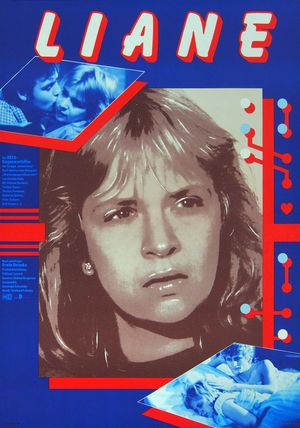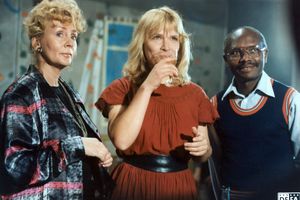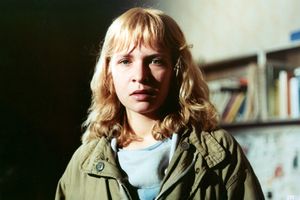Liane
Director: Erwin Stranka, 96 Min., Color, Feature Film
Deutsche Demokratische Republik (DDR)
DEFA-Studio für Spielfilme, 1987
- Film/Video Format
- 35 mm
- Length in m
- 2628
- English Title
- Liane
- Premiere Date
- Release Date (for Cinema)
- Literary Source
- Dahn, Daniela: "Warum ausgerechnet ich?", Hörspiel

(Dir.: Erwin Stranka, 1987)
Short Summary (English)
"Why me of all people?", Liane asks when she is told to leave her brigade at the vapour-blasting plant, and in doing so, to give up her position as a skilled electronics worker. Instead, she is assigned a job which is intellectually far less demanding but indeed exhausting because of its monotonous nature. In addition, she is expected to do stand-ins in future.
There are of course reasons for this directive: both the lack of labourers in pre-production and a machine in Liane's former department make her labour power seem dispensable. Naturally, Liane is aware of these obvious factors. Soon this whole matter holds only secondary importance for her, as personal problems move into the foreground. Liane has fallen in love with Jürgen, a research student at the computer centre. She also has to look for a flat as she finds it increasingly difficult to get on with her younger brother and single mother. And to make matters worse, her workmate Kalle is faced with a crisis - his colleagues suspect him of deceitful manipulations at the plant.
Liane, however, has confidence in him. In her struggle for truth and justice, she does not want Kalle to accept part of the blame for the strife in the brigade; she suspects that he has submitted to the circumstances, something which is completely alien to her nature.
Liane honestly grapples with numerous problems although she has a lot on her plate - Jürgen does not return her unconditional love...
Source: Progress Film-Verleih

(Dir.: Erwin Stranka, 1987) Photography: Siegfried Skoluda

(Dir.: Erwin Stranka, 1987) Photography: Siegfried Skoluda
Film Crew
- Director
-
- Erwin Stranka
- Script
-
- Erwin Stranka
- Scenario
-
- Erwin Stranka
- Camera
-
- Helmut Bergmann
- Film Editing
-
- Helga Krause
- Cast
-
- Arianne Borbach (Liane)
- Torsten Bauer (Kalle)
- Thomas Putensen (Jürgen)
- Kathrin Funke (Marion)
- Ingo Zahlmann (Freddy)
- Christine Schorn (Lianes Mutter)
- Peter Sodann (Lianes Vater)
- Rolf Hoppe (Jürgens Vater)
- Gertraud (auch: Trude) Kreißig (Meisterin Röwer)
- Waltraut (auch: Waltraud) Kramm (Frau Pagel)
- Andreas Herrmann (Abteilungsleiter Berner)
- Wolfgang Winkler (Bereichsleiter Sager)
- Désiré Munyakazi (Tambo)
- Gerd Staiger (Regisseur)
- Irene Kleinschmidt (Hanne)
- Rita Feldmeier (Frau von der Wohnraumlenkung)
- Ulrich Thein (Direktor)
- Ahmad Mesgarha (Mann im Rechnerraum)
- Michael Klobe (Betrunkener)
- Peter Köhncke (Freier)
- Carlo Schmidt (BGL-Vorsitzender)
- Peter Pauli (Herr Behrend)
- Christa Scheuner (Frau Behrend)
- Siegfried Nürnberger (Mitglied der Parteikontrollkommission)
- Karin Beewen (Sekretärin)
- Assistant Director
-
- Igor Kroitzsch
- Assistant Camera
-
- Siegfried Skoluda
- Wolfgang Kroffke
- Production Design
-
- Christoph Schneider
- Script Editing
-
- Dieter Wolf
- Music
-
- Reinhard Lakomy
- Dialog (Musikgruppe) (Titel: "Dialog")
- Sound
-
- Günter Witt
- Konrad Walle (Tonmischung)
- Musical Performance
-
- Dialog (Musikgruppe)
- Costume Design
-
- Günther Pohl
- Make-Up
-
- Kurt Adler
- Props
-
- Rainer Matschke
- Olaf Kleps
- Production Management
-
- Volkmar Leweck
- Unit Production Management
-
- Karl-Heinz Marzahn
- Werner Teichmann
- DEFA Photography
-
- Siegfried Skoluda
Awards
- 5. Nationales Spielfilmfestival der DDR Karl-Marx-Stadt (1988): "Großer Steiger" (gelungene Darstellung einer sozialistischen Arbeiterpersönlichkeit) - Arianne Borbach
- Theodor-Fontane-Preis der Stadt Potsdam (1988): Theodor-Fontane-Preis - Helmut Bergmann
- Theodor-Fontane-Preis der Stadt Potsdam (1988): Theodor-Fontane-Preis - Dieter Wolf
- Theodor-Fontane-Preis der Stadt Potsdam (1988): Theodor-Fontane-Preis - Arianne Borbach
- Theodor-Fontane-Preis der Stadt Potsdam (1988): Theodor-Fontane-Preis - Erwin Stranka
Short Summary (German)
Liane ist zwanzig Jahre alt, Elektronikfacharbeiterin und hat eine Menge Probleme. Doch sie stellt Ansprüche an sich und das Leben. Sie sucht eine Bleibe, um dem zerrütteten Elternhaus zu entkommen. Im Betrieb meldet sie Widerspruch an, als man sie in eine andere Abteilung zu einer weniger anspruchsvollen Arbeit versetzt - allerdings vergebens. Sie verliebt sich in den Forschungsstudenten Jürgen. Und obwohl sie mit ihren eigenen Angelegenheiten völlig ausgelastet wäre, mischt sie sich überall ein, wo sie Ungerechtigkeit sieht. Zum Beispiel als ihr Kollege Kalle von den anderen angegriffen wird, weil er im Gegensatz zu ihnen fast keinen Ausschuss produziert. Sie werfen ihm Betrug oder Verheimlichung einer besseren Arbeitsmethode vor. Der stille Kalle resigniert bald, was Liane ihm zum Vorwurf macht. Kalle liebt Liane, doch sie hängt an Jürgen, und sie ist schwanger. Als Jürgen sie betrügt und sie erkennt, dass seine Gefühle so tief nicht sind, bricht sie zusammen. Vielleicht gelingt ihr mit Kalle ein neuer Anfang.
(Quelle: Das zweite Leben der Filmstadt Babelsberg. DEFA-Spielfilme 1946-1992)
Short Summary (Other Languages)
Liane ha vent'anni, lavora come operaia specializzata, ma ha un sacco di problemi, che tuttavia non le impediscono di avanzare pretese su sé stessa e la vita. Alla ricerca di un alloggio, che le permetta di lasciare casa dei suoi, si oppone ad essere trasferita in un'altra sezione dell’azienda dove dovrà svolgere un lavoro di minor responsabilità. Innamorata dello studente Jürgen, resta in cinta, ma quando scopre che lui la tradisce, si rifugia nelle braccia di Kalle, taciturno collega, che la ragazza aveva sempre difeso di fronte alle ingiustizie in azienda. (Italienisch)



![[Translate to English:] LIANE Film still for "Liane"](https://www.defa-stiftung.de/fileadmin/DEFA_Stiftung/_processed_/3/3/csm_LIANE_6_Copyright_DEFA_Stiftung_Siegfried_Skoluda_f6bfdef31f.jpg)